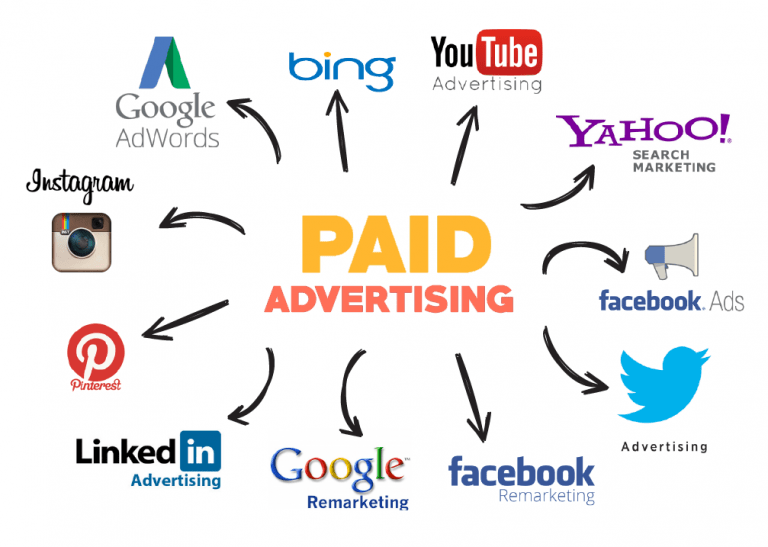The Internet is one of the essentials of our regular life. Nowadays, it is almost impossible not to have a digital identity or leave a digital trail. The digital marketing industry has experienced rapid growth since its inception. If we look at the retrospective data of the study on income in Internet advertising by IAB, in the United States, the average income from online advertising in 2006 was $16,879, which reached $72,521 in 2016, so we can say that in 10 years it has quadrupled its income.
The 3 phases of marketing evolution:-
So far, we have focused on how technology has affected digital marketing. Let us try to understand it from a business perspective. Based on a business perspective, there are three stages of digital marketing.
Marketing 1.0 or product: In the origins of the marketing business, and for many years, advertising focused only on highlighting the product qualities. This stage coincided with a time when consumption was lower, the social audience was more compact, competition between brands was low, communication channels were scarce and costly, and, besides, few brands had a sufficient budget to access them.
Marketing 2.0 or customer: When competition and consumption started to increase, brands had to find new ways to differentiate themselves – emphasizing too much on product promotion was no longer enough. Also, the appearance of new communication channels caused the audience to flee. The advertising messages put aside the rational benefit and began to seek subjectivity and evocation. It was about selling sensations.
Marketing 3.0 or social: It is a new dimension that the world has entered. Following the rise of new technologies and the Internet and the breakdown of all communication barriers, one-way messages have become direct dialogues between customers and brands, completely changing the concept of advertising. It is a new marketing model that no longer focuses on the target audience but the specific consumers. The fundamental difference in this marketing trait is the personalization of the marketing experience. Rather than focusing your marketing efforts on a group audience, it focuses on individual consumers to enhance user experience.
Importance of Digital Marketing
Basically, Digital Marketing is the process of improvising online platforms to increase the awareness and visibility of a product or service.
Measurement: Measuring the progress of a digital marketing campaign is much easier than a traditional marketing campaign.
Personalization: Digital marketing essentializes personalization. It allows personalizing the user experience based on data-driven strategies.
Brand Visibility: A company will lag far behind its competitors if it does not have an online presence. Most people search the web before buying a product or service.
Customer Acquisition and Loyalty: Digital marketing essentializes Customer Acquisition means attracting potential customers and retaining current customers.
Increase in Sales: Digital marketing provides various tools and services to browse the Internet for your target audience and align your marketing strategy accordingly.
Create a Community: Digital marketing, specifically social media marketing, allows you to create your brand audience and essentializes an emotional link between them and your brand.
Channel with Great Reach: Digital marketing uses the Internet and social networks as a channel to reach its target audience. It enables you to reach potential business prospects and increase your brand audience.
Low Cost: Digital marketing is more affordable than traditional marketing, making them accessible to small and medium businesses.
Essential components of digital marketing:-
The website:-

It is essential to have a professional website to generate credibility and trust so that potential customers are encouraged to have a business relationship with the company. The website must be easy to navigate and have relevant information to acquaint your visitors with the products and services you provide.
Search engine optimization (SEO):-
Search engine optimization, also called SEO, aims at increasing the visibility of a website. It aims at increasing the organic SERP rankings of a website to reach as many potential business prospects as possible. SEO is one of the digital marketing strategies that help you drive traffic to your website.
Social media marketing (SMM):-

Having a social presence is one of the essentials of digital marketing. Every business must have a social presence on the primary social media platforms, such as Facebook, Instagram, Twitter, LinkedIn, YouTube, Pinterest, and Snapchat. However, the main objective of social media marketing is to increase brand awareness and not sell products. The primary goal of social media is to engage consumers and then introduce them to the sales funnel.
Paid marketing:–

Advertising on search engines (AdWords) and social networks such as Facebook and Instagram have become an excellent option for companies to reach their target audience. It enables the business to seek immediate exposure to their potential business prospects and achieve their marketing goals.
Email marketing:–
Email marketing is very effective for businesses selling electronics. It enables them to grab consumers’ attention and drive them to their website and increase sales. Emailing a value-added newsletter for the audience works very well to acquaint consumers with your brand and get them to take actions essential for the success of your marketing campaign.
Voice SEO:–
Voice SEO is among the essentials of modern SEO. According to a Statista report, more than 55% of American households will have home voice assistance by 2022. It makes it essential to optimize your blog posts for voice search. One of the easiest ways is to focus on long-tail keywords. The voice search queries are usually in the form of a question. Frame a question out of your target keyword to get better results with voice SEO.
There is no magic wand for defining the best online marketing strategies, tips, or guidelines for businesses to begin with digital marketing. A perfect digital marketing strategy is obtained only after research, trial, and error, and establishing parameters about optimizing your marketing strategy for best results. It is a combination of tools, tactics, and actionable steps used by digital marketing company you hire that determines the success of your marketing campaign.
Sure, there are a few digital marketing basics you need to understand before framing a strategy for your business. But trust us, it’s not rocket science. And if you are passionate about watching your online business grow, you must incorporate these basics into your marketing strategy.
We believe that this topic of online marketing is the most vital knowledge a marketer should have to excel in their marketing campaign.
How to come up with a perfect digital marketing strategy?
A digital marketing strategy is indispensable for the success of your marketing campaign. Besides, it is essential to know the right way to frame a digital marketing strategy catered to your business-specific demands. Here are the steps you must take to frame a comprehensive digital marketing strategy to support your business endeavors.
- Define your brand:-
Defining your brand is the primary step to building a marketing strategy. Think of it as an exercise to understand your business. The primary things to focus on are the unique selling points and the brand voice. It enables you to identify the right approach to marketing your business.
- Build a customer persona:-
A customer persona is a document including essential attributes defining your potential customers. It includes demographics, age, gender, and most importantly, their motivations. Take your time defining the consumer persona, as all your marketing efforts will revolve around them.
- Define goals and objectives:-
Goals and objectives provide direction to your digital marketing strategy. It is what you aim to achieve through your marketing campaign. Increasing brand awareness, generating leads, generating sales are some of the most common marketing goals. Do not confuse your goals with your objectives. Goals are a basis for your marketing strategy. Whereas, the objectives define the exact numbers you aim to achieve at the end of your marketing campaign.
- Choose the correct strategy:-
Choose from among the digital marketing strategies that best fit your marketing campaign. You must look for the ones that best help you achieve your marketing goals. If your goal is to increase brand awareness, social media marketing would be a better strategy. Similarly, you can achieve better results on a sales campaign by improvising paid marketing. One thing that is common among all marketing strategies is the content. Create high-quality content to add value to your consumer life and achieve your business goals.
- Set budget:-
At this stage, you must set a budget for your marketing efforts. Based on your objectives, speculate the profits you aim to achieve at the end of the marketing campaign. Determine the budget you will require to meet the goals you set for your marketing campaign. It provides you with an overview of the capital in hand to maintain the cost of the marketing campaign. It is essential to manage the cost of the marketing campaign as low as possible to increase your profit percentage.
- Document your strategy:-
It is essential to plan your marketing journey before implementing it. It provides you with a step-by-step overview of your digital marketing strategy. It is one of the easiest ways to divide your work into simple tasks. It enables you to create a work-down structure essential to establish coordination between the employees working on the project and ensure the successful execution of your marketing strategy.
- Begin execution:-
After the documentation of the strategy, you must ensure the successful execution of the marketing strategy. Several essential activities require coordination to ensure the successful implementation of your marketing strategy. The biggest challenge is to make different departments work in the sink towards the constructive progress of your marketing strategy. One of the easiest ways to ensure the proper execution of the marketing strategy is to assign it to a project manager. It is then his responsibility to cooperate with all departments and ensure successful implementation.
- Track progress:-
Once the campaign is live, you must track its progress with essential matrices and caprices. It is best if the campaign progress as planned. However, if not, you must focus on altering the tactics used to enhance the productivity of the marketing campaign. It enables you to identify the weak points of your marketing strategy and eradicate them to add quality to your ongoing campaign.
Conclusion
Digital marketing is a complex method. It can no longer be defined as the utilization of the internet for product promotion. It is a broad term to explain in one sentence. There are a lot of technical components that need to function together to ensure the success of a digital marketing campaign.
It is essential to understand the problems your target audience is having. You must focus on solving consumer problems and improving user experience. Establishing your business authority is all about interacting with consumers and solving their issues in the easiest way possible. It leaves a good image of your business in your consumer’s minds, and your business becomes known to them. It is why creating and interacting with a community is essential for the chronic growth of a business.



Add a Comment